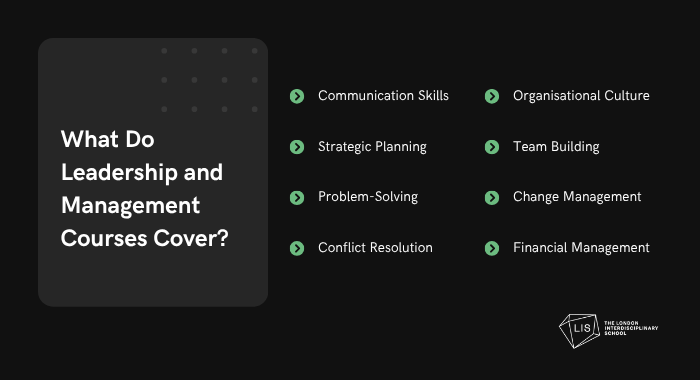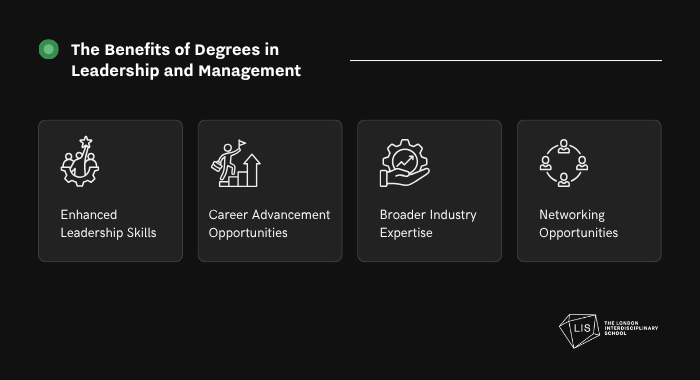Leadership and Management Courses: Great Pathways for Career Growth
.png)
Aspiring leaders need expert skills in communication, critical thinking, problem-solving, and managing teams across various disciplines if they want to guide organisations to success.
There are many leadership and management courses and degree pathways available to help you progress your career, transition into a new field, or deepen your knowledge. At LIS, we focus on interdisciplinary degree pathways and courses to help leaders and managers stand out in the job market.
This guide explores what leadership and management courses cover, the top degree pathways and courses to advance your expertise, and how to choose the best programme.
Table of Contents
- What Do Leadership and Management Courses Cover?
- Leadership and Management Degree Pathways
- The Benefits of Degrees in Leadership and Management
- Leadership and Management Short Courses
- The Benefits of Short Courses in Leadership and Management
- How to Choose Your Leadership and Management Degree or Course
- Choose LIS to Succeed in Leadership and Management Career Roles Today
Leadership and management courses are designed for students seeking management skills and leadership roles. These courses are designed for aspiring professionals without expertise in this field who aim to develop foundational leadership skills to launch their careers. In addition, these pathways are also ideal for mid-level professionals who want to become senior leaders in their desired fields.
While the exact topics covered differ between learning pathways, here's an idea of what you can learn:
- Communication Skills: Mastering non-verbal and verbal communication, delivering constructive feedback, and understanding people from various backgrounds.
- Strategic Planning: Developing clear objectives and goals and aligning team efforts toward a common purpose.
- Problem-Solving: Applying innovative solutions to solve complex problems and simplify workflows.
- Conflict Resolution: Defining strategies to effectively address, de-escalate, and solve disagreements.
- Organisational Culture: Learn how to maintain a positive work environment, geared toward success and self-development.
- Team Building: Manage teams in various departments and foster thriving employee relationships.
- Change Management: Navigate workplace changes and lead teams through transitions.
- Financial Management: Understand financial principles, how they relate to organisational performance, and how to optimise revenue.

Here is a selection of leadership and management degree pathways to help you achieve your career goals.
Master of Business Administration (MBA)
A master of Business Administration (MBA) is the ideal leadership and management degree pathway for professionals who want advanced expertise for executive-level roles.
At LIS, our MBA programme goes beyond traditional MBAs, helping students understand and navigate global shifts impacting the future and develop meaningful, innovative solutions to critical business issues.
We aim to ensure our MBA graduates know how to identify and act on long-term trends and opportunities, lead confidently, and create value for their organisations through diverse thinking.

Subjects Covered:
- Complexity: Identifying complex systems, quantitative and qualitative methods of complex systems, and organisational design.
- Intelligence: Sector implications of generative AI, task-based AI models, collective intelligence, foresight, and futures thinking.
- Energy: Transition finance, value change marketing, behaviour change, energy transition and conservation sector implications.
- Ecosystems: Economic versus ecological reasoning, governance of change in complex systems, possibilities, and limitations of natural accounting.
- Trust: Privacy and quality of user data, accounting transparency and its limitations, communication and marketing.
- Longevity: Models of demographic and generational change, risk management, human resources, and archetypes of organisation and leadership.
Career Pathways:
The LIS MBA is designed for mid-careers who already have some professional direction, but who see that their role, their organisation, or their sector is undergoing change. Professionals in large organisations can use the skills covered to augment any one functional skill, allowing them to work more cross-functionally. In addition, professionals specialising in one discpline can gain the relative expertise to work at a ‘systems’ level.
These are a few of the career pathways LIS MBA graduates can implement their knowledge and skills:
- Accounting and Finance
- Communications and Marketing
- Analytics
- Research and Design
- Change Management
- Partnerships and Networking
- Transformation
- Strategy and Organisational Learning
- Healthcare Leadership
- Entrepreneurship
- Executive Project Manager
- Senior Management
Ideal For:
The LIS MBA degree is designed for students with management experience seeking to advance their careers into senior and executive roles. You should be an innovative thinker who is passionate about complex problem-solving and wants to help organisations tackle global problems.
Master of International Business (MIB)
The master of International Business (MIB) degree is designed for students who want to secure careers in global business management. You'll develop the expertise to navigate the complexities of international markets, including global trade, cross-cultural communication, and international business strategy.
With this qualification, you'll have career opportunities across various industries and manage pathways that offer practical training, such as internships, exchange programmes and case studies.
Subjects Covered:
- International Marketing
- Global Supply Chain Management
- International Business Strategy
- Cross-Cultural Communication
- Global Trade
Career Pathways:
- Global Business Strategist
- International Marketing Manager
- Cross-Border Project Manager
Ideal For:
An MIIB degree is best for professionals with foundational leadership and management skills who want to deepen their understanding of international business tactics.
Master of Science in Management (MSM)
If you want an advanced degree focusing on expert management principles, the Master of Science in Management (MSM) is the perfect choice. These pathways focus on the expertise required to manage and lead teams, make strategic decisions, and solve critical business problems.
Students will find that MSM programs often have fewer professional requirements to enrol and more emphasis on management concepts.
Subjects Covered:
- Financial Management
- Strategic Planning
- Organisational Management
- Operations
- Human Resource Management
Career Pathways:
- Project Manager
- Organisational Developer
- Business Consultant
Ideal For:
MSM degrees are suited for students who want to gain in-depth management knowledge without having the professional experience most MBA degrees require.
Master of Public Administration (MPA)
These master's degrees equip students with management expertise for the public sector, such as government agencies, nonprofits, and international organisations. Throughout your programme, you'll develop a strong understanding of the legal, political, and economic environments in which public companies operate.
You'll also participate in capstone projects, internships, and collaborations with government entities.
Subjects Covered:
- Public Policy Analysis
- Public Finance
- Organisational Behaviour
- Governance
Career Pathways:
- Nonprofit Executives
- City Managers
- Public Policy Analysts
Ideal For:
Students passionate about working in the public sector and wanting to secure high-level roles in this industry are the perfect fit for an MPA degree.
Master of Healthcare Administration (MHA)
A master of Healthcare Administration (MHA) is an excellent option for students seeking leadership and management positions in the healthcare industry. These degree pathways specialise in the management areas of healthcare, addressing the complexity of this industry and the requirements for senior roles in hospital, clinic, and healthcare insurance management.
Subjects Covered:
- Health Policy
- Financial Management
- Healthcare Law
- Healthcare Systems Operations
Career Pathways:
- Hospital Administrator
- Healthcare Consultants
- Public Health Leaders
Ideal For:
An MHA is an advanced degree intended for students with foundational management and leadership skills who want to specialise in the healthcare industry.
These pathways can offer several benefits to aspiring or growing leaders.

Enhanced Leadership Skills
Advanced degrees in leadership and management equip students with the expertise to become successful team leaders, make strategic decisions, and guide organisations to success. After graduation, you'll know how to resolve conflict, motivate cross-functional teams, and work with individuals from diverse backgrounds.
Career Advancement Opportunities
One direct advantage of a degree in leadership and management is that it allows you to secure higher-level positions. With these qualifications, graduates can become senior managers and hold executive roles. This career progression results in higher earning potential; MBA graduates earn around £64,500 annually.
Broader Industry Expertise
These degree pathways offer in-depth knowledge valuable in various sectors, including healthcare, business, public administration, and nonprofit organisations. Aspiring leaders can develop expert skills to lead high-performing teams and excel in any industry they prefer.
Networking Opportunities
Advanced degrees often provide networking opportunities to establish industry connections, internships, and potential employment offers. Many universities have relationships with esteemed companies to provide career pathways to graduates. You can also attend workshops and events that help you find a job.
With so many short leadership and management courses available, finding the best career choice can be challenging. Here are a few types of courses to consider.
Cross-Functional Leadership
Cross-functional leadership courses equip aspiring leaders with skills for managing teams across different departments. At LIS, our cross-functional leadership course requires two months of studying, and students can complete most of the course content online. You'll learn to navigate different perspectives and break away from traditional, siloed leadership.

Subjects Covered:
- Complexity: Identify various types of complexity and how to identify emergent properties of complex systems.
- Visualisation: Learn visual techniques to convey your ideas.
- Communication: Understand how to speak fluently across varying expertise and communication styles.
- Collaboration: Recognise opportunities for collaboration and run effective meetings.
- Systems Thinking: Learn how to think in terms of systemic thinking.
- Problem-Solving: Discover how to identify and analyse problems from diverse perspectives.
- Integration: Leverage interdisciplinary techniques to synthesise multiple perspectives.
Ideal For:
The LIS cross-functional course is the best option for aspiring managers who want to understand how to lead diverse teams and expand their leadership skills.
Project Management Leadership Course
Various online and in-person courses focus on project management skills required for successful leaders. These courses explore foundational project management principles and how they influence a manager's day-to-day responsibilities.
Subjects Covered:
- Project Planning
- Risk Management
- Resource Allocation
- Budgeting
- Stakeholder Communication
Ideal For:
These short courses are great for professionals who want to expand their project management knowledge to progress their career prospects and increase their earning potential.
Executive Leadership Course
Another type of management course leadership students can complete is an executive leadership course. These programmes help senior professionals enhance their leadership skills and focus on advanced strategies for leading organisations to success.
Subjects Covered:
- Decision-Making
- Organisational Change Management
- Emotional Intelligence
- Crisis Management
- Executive Communication
Ideal For:
Executive leadership courses are suited for high-level managers in leadership roles who want to improve their skills and provide more value to overall organisational operations and performance.
These are the top advantages of pursuing short courses in leadership and management.

Quick Skill Development
Short courses offer focused, accelerated learning to help you gain essential leadership and management skills without investing years in completing a degree program. As a result, these courses are ideal for professionals who can't commit to advanced degrees or already have foundational expertise they need to expand to improve their job prospects.
Cost-Effective
In contrast to degree programs, short courses are much more cost-effective. You can gain valuable insights into leadership and management without spending a large amount of funds on your studies. Some courses are free while others require a small investment.
Flexibility
If you want to complete short courses in leadership and management, online courses and part-time options offer maximum flexibility. If you have professional or personal commitments, these courses may be the best option for your career.
Immediate Impact
Short courses provide the training and resources you need to apply in your current role immediately. This opportunity means you can improve your performance and leadership abilities to apply for a promotion or secure positions with increased earning potential.
If you’re thinking about a course or degree in leadership and management, here are the top factors to consider:
- Assess Career Goals: Consider whether you want to work in business, healthcare, public service, or another sector.
- Programme Specialisation: Choose a degree that aligns with your specific interests, such as MBA, MHA, or MPA.
- Accreditation: Ensure the programme is accredited by a recognised body to maintain quality and industry relevance.
- Curriculum and Faculty: Review the curriculum and faculty expertise to ensure they match your learning needs and career ambitions.
- Flexibility: Look for programs offering flexible study options to accommodate work or personal commitments.
- Reputation and Network: For career support, consider the institution's reputation and the strength of its alumni network. International students should also consider how the university can help their transition.
- Cost and Financial Aid: Evaluate tuition and available financial aid or scholarships to ensure you can afford your degree.
Leadership and management courses are an excellent option for first-line managers who want to advance their expertise to secure higher-level positions, and experienced leaders who want to brush up on new skills to gain a competitive edge.
These courses offer flexibility and affordability while allowing you to improve specific skills, whether you want to progress your career or switch fields. There are many benefits to degree pathways and courses for aspiring leaders, and it's critical to choose the best programme based on your finances, goals, time commitments and the course content.
Ready to take your leadership and management career to the next level? Contact LIS today.
Share this story
Sign up for our newsletter
Don't miss out on important updates including course information, new announcements, Open Day dates and the latest LIS news.













































.svg)

.svg)









.webp)
This is a comment related to the post above. It was submitted in a form, formatted by Make, and then approved by an admin. After getting approved, it was sent to Webflow and stored in a rich text field.